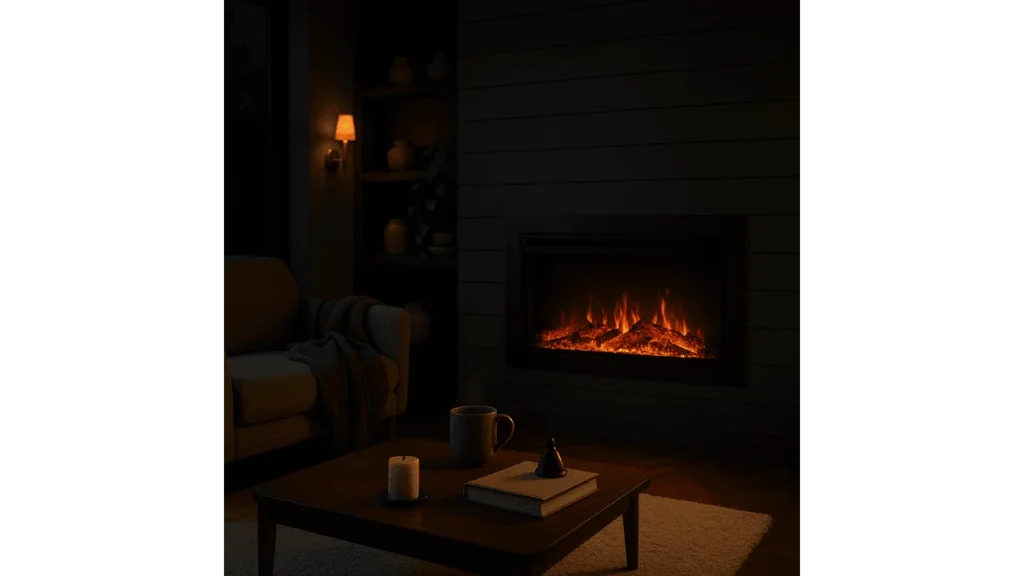Electric fireplaces have become a modern favorite for homeowners seeking warmth and ambiance without the mess or hazard of traditional flames. One of the most common questions that arises, especially during cold months, is whether it’s safe or efficient to leave an electric fireplace running overnight. The answer depends on how the unit is used, its safety features, and whether your setup follows best practices. As someone who’s tested, installed, and lived with a wide range of electric fireplace models, I can tell you that overnight use is generally safe, but it comes with important caveats.
How Do Electric Fireplaces Work?
Unlike wood or gas fireplaces, electric fireplaces don’t rely on combustion. Instead, they use internal heating elements, typically ceramic or infrared coils, paired with a fan system to distribute heat. Many also offer flame-only modes, which replicate the look of a real fire using LED lighting without emitting heat. This design means there’s no actual flame or exhaust, making the appliance safer to operate for long periods, including overnight use.
Most modern models come with built-in safety mechanisms like automatic shutoff sensors and overheat protection. These features allow the unit to monitor internal temperatures and shut down if it starts to overheat. I’ve personally seen these systems work flawlessly when units were left on for extended hours, especially when operating in low or flame-only settings.
Read More: How to Replace an Electric Fireplace Switch?
Is It Safe to Leave an Electric Fireplace On Overnight?
The short answer is yes, if the fireplace is functioning properly and installed correctly, it can be left running overnight, especially in a low-heat or flame-only mode. According to Sarah Donnelly, a certified fire safety assessor and consultant in British Columbia,
“Electric fireplaces are among the safest heating appliances for overnight use, provided you’re using them according to the manufacturer’s guidelines and electrical standards.”
That said, leaving your unit on high heat all night isn’t always ideal. While it likely won’t cause damage or fires in modern models, it can increase energy consumption and reduce the overall lifespan of internal components. Homeowners who’ve used electric fireplaces for years often report better longevity when heat settings are cycled or kept on low rather than maxed out.
What Are the Main Risks of All-Night Operation?
Although rare, potential risks exist if units are misused. One of the most common issues comes from improper placement, installing fireplaces too close to flammable materials like curtains, bedding, or wooden shelving. I’ve inspected installations where this mistake posed a real hazard despite the fireplace having “cool touch” housing.
Power source matters too. Never plug an electric fireplace into an extension cord or power strip. This remains one of the top causes of overheating incidents. Units should always be plugged directly into a grounded wall outlet, ideally one that doesn’t share load with other high-wattage appliances. You also need to ensure that intake and output vents remain clear of dust and debris. Blocked airflow can interfere with heat distribution and trigger automatic shutoffs or worse, lead to overheating.
Expert Tips for Safe and Efficient Overnight Use
To safely enjoy the warmth and glow of your fireplace through the night, follow a few simple rules. Start by placing the unit on a flat, stable surface and give it proper clearance from any soft furnishings. Make it a habit to clean vents regularly and visually inspect the cord for wear. If your model includes a timer or auto-shutoff, set it for several hours rather than running it continuously, this not only protects the appliance but also saves energy.
Erik Lanners, an appliance technician based in Manchester, notes,
“The safest overnight setup involves a recessed or wall-mounted electric fireplace with a dedicated breaker and a timer shutoff. These setups are nearly foolproof in terms of safety.”
If your home tends to run cold at night and you rely on the fireplace for warmth, keep it in low-heat mode or pair it with a smart thermostat plug that turns it off at a set time. These affordable accessories offer peace of mind without sacrificing comfort.
Are There Better Alternatives for Nighttime Heating?
While electric fireplaces are a reliable heating option, they may not be the most energy-efficient overnight solution if used at full capacity. Space heaters with thermostatic controls or energy-efficient radiators may offer better heat regulation, especially in smaller bedrooms or areas that retain heat poorly. However, none will provide the same visual warmth and ambiance that a fireplace adds to a space, something many homeowners find just as valuable during cold winter nights.
Still, electric fireplaces remain popular because they’re low maintenance, mess-free, and visually inviting. When used properly, they’re both functional and decorative, a rare combination in home heating.
Final Takeaways
Yes, you can safely leave an electric fireplace on overnight, but only if you follow the right precautions. Use built-in timers and overheat protection features, keep it clear of obstructions, and plug it directly into a grounded wall outlet. Stick with low or flame-only modes for overnight use to minimize wear and energy use. Modern electric fireplaces are designed for safety, but responsible operation still matters. With the right setup, you can enjoy a warm, worry-free night surrounded by cozy ambiance.
- 27 Farmhouse Fireplace Ideas That Bring Warmth & Charm - August 18, 2025
- 25 Fireplace Lighting Ideas to Illuminate Your Hearth - August 7, 2025
- How to Replace an Electric Fireplace Switch? - August 5, 2025



